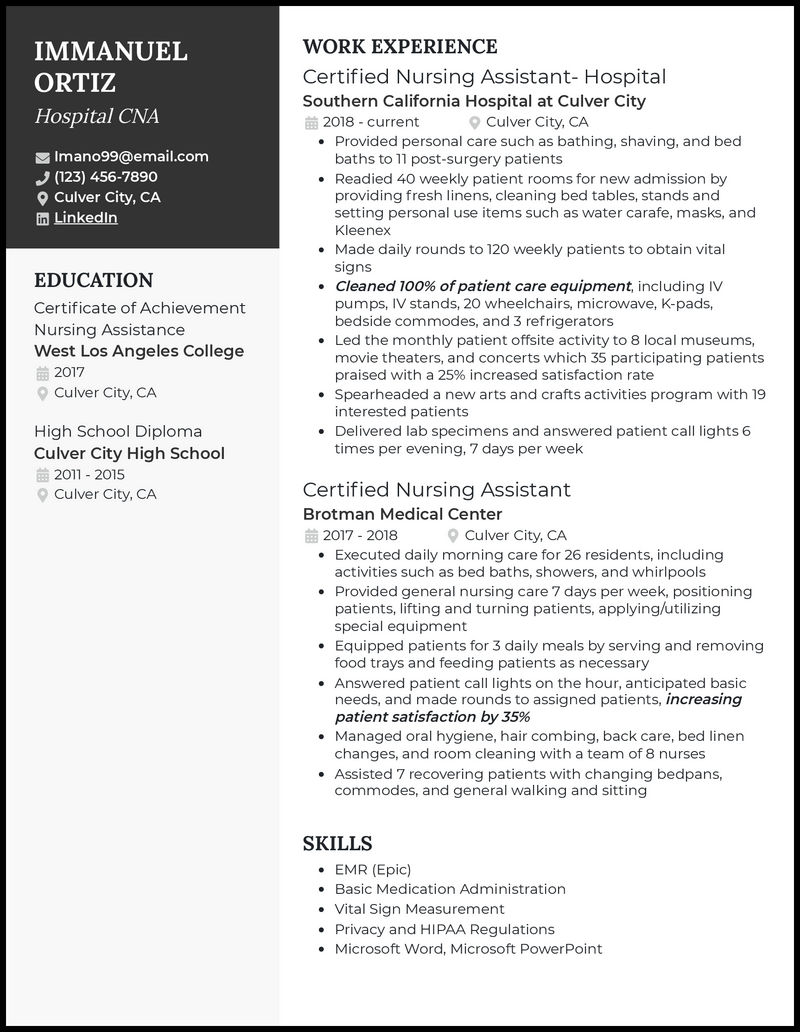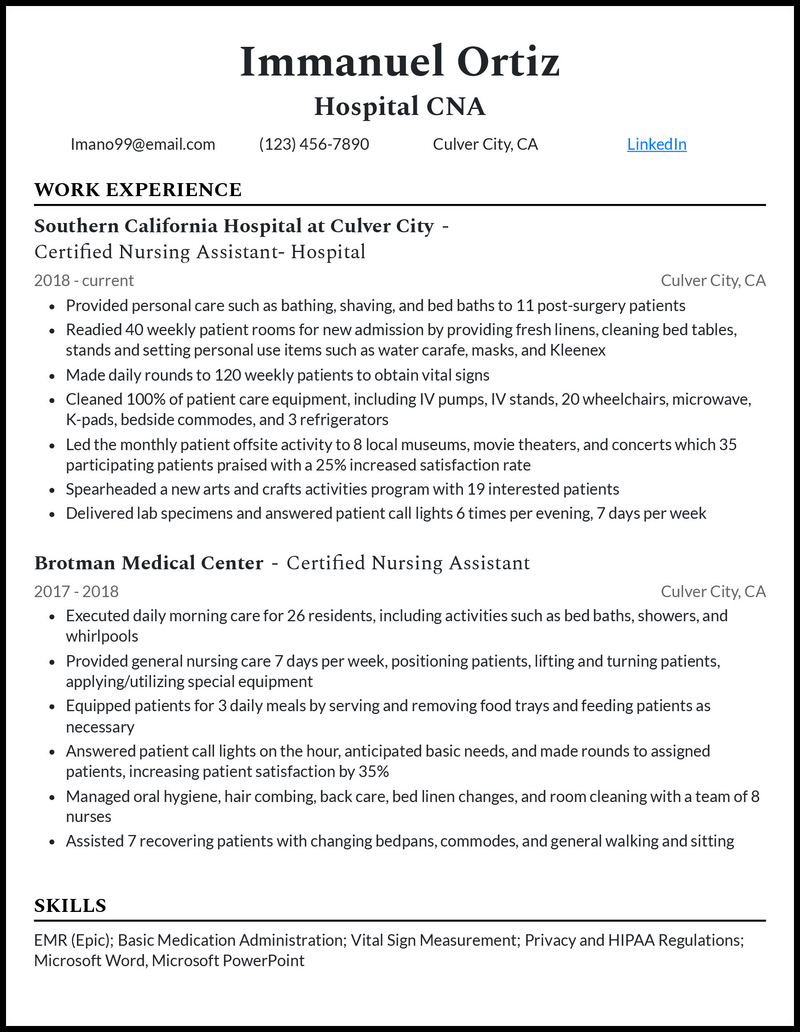No two days are the same for a hospital CNA like you since you assist RNs and other hospital staff members with everything from bedridden patient care to responding to patient calls. Alongside answering patients’ needs, you also report your observations to your nursing supervisor and handle phone calls.
But what skills and nursing qualifications make a good resume in the eyes of recruiters so that you can start assisting other medical staff right away?
Luckily, we’ve spent years helping medical professionals with their career docs, and we’ve nailed down these three solid hospital CNA resume templates and a cover letter writer to get you closer to your dream role!
Related resume examples
What Matters Most: Your Skills & Experience Sections

Since you play an important assisting role in the hospital setting, recruiters need an immediate overview of how you’re equipped to handle the job. Your skills list can help you by quickly listing abilities that show your unique fit for the position.
Stick with exclusive, profession-related skills whenever possible. Anyone can say “people skills,” but something like “patient questionnaires” immediately reinforces your communication capabilities as a hospital CNA.
Be specific, too: Don’t settle for “patient care” when you’re better off clarifying that you’re great at “vital sign measurement.” And if you use any programs to support your nursing supervisor, name them!
9 most popular hospital CNA skills
- MS Word
- EMR
- Vital Signs Monitoring
- Patient Privacy / HIPAA
- Data Entry
- Medication Provision
- Meal Monitoring
- Patient Reports
- Bedside Care
Sample hospital CNA work experience bullet points
Skills are essential for a successful day of assisting medical personnel, but recruiters really want stories of how you’ve been successful in the past. How have you improved patients’ hospital stays and kept things efficient for RNs?
Cite specific examples of your success, like the time you guided activities for residential patients to boost positive experience ratings. Mention how you expedited response times when patients rang for help.
And always provide metrics like satisfaction percentages and work hours you alleviated with your efficiency. Quantifiable data is crucial for credibility!
Here are some good samples:
- Answered patient call lights on the hour, anticipating basic needs and making rounds to assigned patients, increasing patient comfort by 34%
- Made daily rounds to 36 patients to obtain vital signs, maintaining a 99% record accuracy rate
- Led the monthly patient offsite activity to 8 local museums, theaters, and concerts, resulting in a 4.8/5-star positive feedback rate
- Delivered lab specimens and completed appropriate documentation in MS Excel, reducing error rates by 12%
Top 5 Tips for Your Hospital CNA Resume
- Show off your adaptability
- Your day includes everything from changing patients’ bedding to planning arts and crafts activities for daily enrichment during recovery. Pull in various examples to showcase your ability to do it all.
- Include additional certifications
- A certification like EMR is great to include alongside others like CPR or Basic Life Support (BLS). If you have lots of certs, they may warrant their own section, but if you boast only one or two certs, they might fit best in your skills section.
- Be technical
- Demonstrate your ability to handle technical aspects of the medical environment: Think of tasks like handling and sterilizing routine and specialized care equipment. Bedside manner is super important, but your technical skills should take the spotlight.
- Show soft skills through context
- Since your skills list should focus more on hard and technical skills, use your experience section to demonstrate your compassionate bedside manner. Just a few words like “Enriched patients’ recovery periods with morale-boosting activities . . .” can add valuable personal context to your achievements and metrics!
- Avoid “floating” metrics
- Metrics like random counts of tasks or patient headcounts should only be included if they boost the grand finale of your experience point. For example, “assisting 52 patients” isn’t super impressive, but “assisting 52 patients, increasing comfort levels by 34%” packs more of a punch.
Don’t let your content spill onto the second page of your resume template. Keep it to a page—as tidy as the meal trays you bring your patients! You can even make it shorter than one page if that means letting your greatest points shine brighter.
If you run out of space on your resume to share how quickly you learned things like basic medical equipment care and maintenance, discuss your hospital CNA achievements in your hospital CNA cover letter.
Revisit each hospital CNA job description and tailor your resume to match its angle: If you’re applying to a hospital that focuses on patients with long-term stays, highlight how well you handle bedside care and daily patient wellness tasks.








